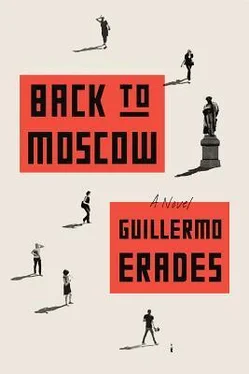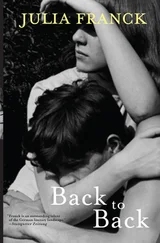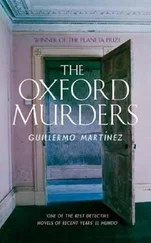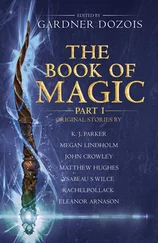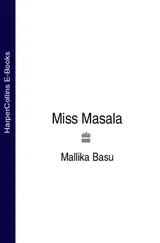I approach her. ‘I need to talk to you,’ I say.
‘You are drunk, Martin.’
‘I’m OK, Lena, I just don’t know what’s going on. Let’s go out for just five minutes.’
The fat American guy now steps in between Lena and me, puts his hand on my chest. ‘Back off, asshole.’
‘Be cool, man,’ I say. ‘I only want to talk to her.’
Then he pushes me and, pissed as I am, I fall to the floor, which is dirty and wet. I get to my knees, and I feel I’m about to puke again. I breathe deeply, trying to gather my thoughts, and then someone grabs me and pulls me up. It’s Diego.
I see the American guy smiling, now putting an arm around Lena, and I find myself punching him with all my strength, except that what I hit is not his face as I had intended, but his neck. It doesn’t feel like a clean punch, not that I really know how a clean punch feels. Somebody pushes me. A soft slap lands on the back of my head. Now Stepanov steps in, shouting in Russian. Diego is holding me and I’m confused. I never get into fights.
Next thing I know I’m outside the club, sitting on the pavement, next to what I suspect is my own vomit. Colin sits on my other side with a bottle of water.
‘Drink some cold water, man.’
I feel pain in my hand and in my knees. For a few seconds I don’t remember Lena or the guy or how I ended up here and during these seconds I’m puzzled but unhurt. Then the image comes back into my head, the shiny boots, the red lipstick, the push-up bra, the American man with sweat patches under his armpits, and it hurts like hell and, with embarrassment, I notice tears in my eyes.
‘Where is she?’ I say.
‘Who?’
‘Lena. Where is she? I need to talk to her,’ I say, trying hard to hold back my tears in front of Colin.
‘They’re all gone, man.’
‘Where to?’
‘Fuck knows. We’ve all been kicked out. Congratulations, our first time. Now we know what it takes to get kicked out of a trashy club in Moscow.’
‘Where did they go?’ I ask.
‘Forget about them,’ Colin says. ‘Come on, throw up a bit more before you get in a car. We need to get you home.’
I WAKE UP AROUND NOON. I open the balcony door, step outside. I glance at the grey roofs and the grey sky, trying to gather my memories of the night and, as soon as a coherent sequence of events forms in my head, I feel my lungs shrink. Back inside, the flat feels small, claustrophobic, as if during the night the ceiling has lowered and the walls have moved closer to each other. I need to get out. I shower quickly, dress, rush down the stairs and out onto the street.
I turn the corner into the Boulevard, my pace faster than usual, my mind bombarded with images of the Boarhouse: the boots, the cleavage, the miniskirt, the fat American. My right hand is swollen, my entire body aches. As I instinctively turn left at Bolshaya Nikitskaya, I start to recall the Amsterdam moment, now three years ago, when I found out about Katya’s affair. I remember how the entire university knew by then, everybody except me, and how the thought of Katya with her law professor sparked a physical ache, a painful emptiness in my chest, not unlike what I now feel thinking of Lena and her Boarhouse companion.
At the end of the street I turn right and walk until I reach the Russian State Library, still known as Biblioteka Imeni Lenina, with its enormous neoclassical columns, and I approach Dostoyevsky’s statue, a mournful Fyodor Mikhailovich facing the street, far from the entrance, his back to the library like a punished schoolboy. The soul is the depository of human contradictions, of the eternal struggle between God and evil, he says to me, and I walk towards Okhotny Ryad and then Red Square, following the tourists — the guests of the capital, as they are called in metro announcements. As I cross the cobblestones of Red Square, which, it being a Sunday, is crowded, I find some comfort in seeing myself surrounded by other people. The fact that all these strangers don’t know about Lena, that they go on with their business as if nothing had happened, enjoying their morning stroll through the heart of Moscow — unperturbed by the thoughts in my head — makes me feel somehow lighter, less oppressed. I pass by the fairy-tale towers of St Basil’s Cathedral, which always strikes me as smaller and less impressive than in postcards and books, and I see tourists taking pictures of each other, dyevs from the provinces posing like models, one hand on the hip, the other behind the head, walking away from the camera to fit the entire cathedral and the Kremlin into one single frame. I walk past, knowing from my own experience that it’s impossible to take a good photo of Red Square, that the ploschad is too three-dimensional to be captured in a single image and that, whatever the chosen angle, the person in the picture will look small and insignificant.
I cross the bridges, over the dark waters, onto the southern bank, then wander into Pyatnitskaya Ulitsa, which feels like ancient Moscow, with its low buildings and pastel-coloured façades.
Around the metro station there is an explosion of life, Muscovites emerging from the subterranean stairways like disciplined ants, couples holding hands, a stand selling honey and soap, a babushka selling flowers, and for the first time I feel like buying flowers, a nice bouquet for Tatyana, I think, that will make her happy. I approach the babushka, and choose the biggest bouquet. Yellow roses. Twenty-five yellow roses, the babushka says.
I walk towards the river, retracing my steps, and I feel awkward with the flowers, wondering if I should carry the bouquet upright in front of me or if it’s fine to clasp it by the stems with the flowers pointing at the ground, and people are looking at me, the muzhik who’s bringing flowers to his woman, and, in the midst of my pain, the idea provokes — I think — a smile on my face.
It then occurs to me that I didn’t buy the flowers for Tatyana. For a split second my mind replaces the image of Tatyana receiving the yellow roses with that of Lena. I’m aware that I cannot give the flowers to Lena, that it’s Tatyana who will be coming home tonight after the weekend at her aunt’s, and I wonder if I want Lena because I know she won’t be there, and, maybe, if Tatyana were the one who had disappeared from my life, I would feel the same about her.
I cross the bridges back onto the northern bank, turn left and follow the southern wall of the Kremlin towards the cathedral of Christ the Saviour. I walk on the left pavement, by the river. I know Christ the Saviour is gigantic, an enormous building, and yet, as I look up at the distant golden dome under the lead-coloured sky, I’m surprised to see that it looks small and boxy, lacking the elongated elegance of European cathedrals, as if a small Russian country church had been artificially magnified and placed in the centre of Moscow.
There is a sad story about Christ the Saviour. When Sergey first told me about it, I was surprised to learn that it is in fact a brand new construction. Now, as I walk towards the cathedral with the yellow roses in my hand, I wonder where Sergey is, and I think of Ira and wonder if they got back together, and I regret having lost touch with them, because they were my real Russian friends, and back then, when we met, life was simpler and Moscow was such a great place.
Christ the Saviour was initially built to thank God for Napoleon’s defeat in 1812, Sergey had told me after a dinner in his apartment with Ira and Sergey’s mum, as he showed me a series of black and white photographs he had taken of the building. A couple of tsars worked on it but the whole construction wasn’t finished until the 1860s, when it stood as the largest Orthodox cathedral ever made. The cathedral was erected by the Moskva river, its golden dome within sight of the Kremlin. But the soviets, who dropped the capitalisation of the word God and wrote bog instead of Bog, had other plans for the site. In 1931, under Stalin’s orders, the cathedral was dynamited and reduced to rubble.
Читать дальше
